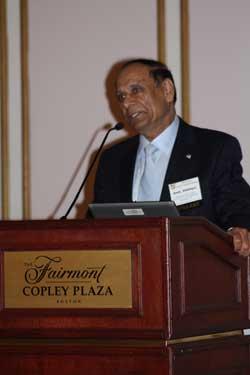The Obama Administration remains committed to the Doha Round of multilateral trade negotiations, but in exchange for opening the U.S. market to foreign goods, “real market access� needs to be granted by developed and advanced developing countries, said Ambassador Islam A. Siddiqui, chief agriculture negotiator for the Office of the U.S. Trade Representative.
Siddiqui, speaking at the U.S. Grains Council’s 50th Annual Board of Delegates Meeting, said more balance is needed in the Doha negotiations. “Since it started in 2001 – nine years ago – the political and economic reality has changed,� he said, noting that countries like China and Brazil have seen their markets and economies and their related role in the global economy change significantly during that time.
“We’re not asking for market access in the least developed countries,� Siddiqui said. “We’re talking about the 35-40 countries that are developed or advanced developing countries.�
Efforts at the World Trade Organization talks now include discussions surrounding unresolved issues, including details on special safeguard mechanisms. These measures allow countries to fight import surges when and if they occur, Siddiqui said. While the United States supports the abilities for countries to have tools that prevent others from flooding certain markets, “we don’t want a tool that can be abused.�
He said some of the more advanced developing countries are hiding behind the least developed countries so they have the ability to enact safeguard mechanisms like raising tariffs whenever they want.
Siddiqui said the bilateral talks going on now are good and the U.S. trade team is meeting with different trade teams from around the world. “The United States is committed to engage and reach an agreement in Doha that is ambitious and balanced,� he said.
Turning next to the topic of bi-lateral free trade agreements (FTA), Ambassador Siddiqui noted that trade officials from the United States and Korea are meeting and working on resolving the remaining obstacles to finalize the FTA between the two countries. Siddiqui said the goal is to have all remaining issues resolved by the time the Asia-Pacific Economic Cooperation meeting is held in Korea this November.
The Korean FTA removes many barriers to trade between the two countries, with two-thirds of Korea’s agriculture imports from the United States becoming duty free when the agreement is enacted. That could increase sales of U.S. agricultural products by some $1.8 billion per year.
Siddiqui, who said the agreement is “robust for agriculture in terms of access,� noted the remaining tariffs, including those for pork and beef, would be phased out over time.
While discussions on resolving issues are ongoing, he said the Administration has not made a decision as to when the FTA would move to Congress for final approval. There has also been no decision as to when two other signed FTAs – with Colombia and Panama – will move to Congress.
“The President has said he’d like to move all of these forward,� he said, but the announcement was made to begin efforts with Korea. “We had to start somewhere,� he concluded.


